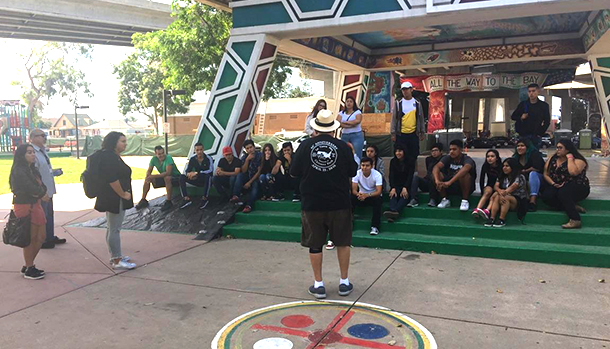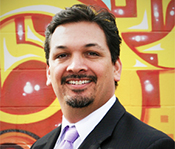
MAAC Community Charter School students visit Chicano Park in San Diego (Photo Credit: MAAC)
 MAAC was founded upon a vision to provide a place where San Diego families in need could find the means to self-sufficiency. In July of 2017, UnidosUS (Previously NCLR) awarded the Affiliate of the Year award to MAAC, which is the highest honor that UnidosUS confers upon its Affiliates, awarded outstanding effort partnering with UnidosUS to broaden opportunities for the Latino community. Arnulfo Manriquez is the president and CEO of MAAC.
MAAC was founded upon a vision to provide a place where San Diego families in need could find the means to self-sufficiency. In July of 2017, UnidosUS (Previously NCLR) awarded the Affiliate of the Year award to MAAC, which is the highest honor that UnidosUS confers upon its Affiliates, awarded outstanding effort partnering with UnidosUS to broaden opportunities for the Latino community. Arnulfo Manriquez is the president and CEO of MAAC.
The issue of economic insecurity is a serious one. We are pleased to add our voice to the growing number of Californians who believe it must be addressed to make attaining the California Dream available to all.
There's no one answer — the problem is too complex. Let's focus on one element today — how to lower the school dropout rate.
Our MAAC Community Charter School opened in 2001 in response to the high percentage of high school pushouts / dropouts in the low income communities of southern San Diego County and the lack of a safety net for these students. While traditional high schools provide us with basic life skills, enhance our academic education, and prepare us for either higher education or the workforce, they are limited in their ability to address the needs that some atypical students face. Low socioeconomic status, social challenges, family instability, language barriers, teen pregnancy, mental health, abuse and many other issues can make it difficult for students to succeed in traditional schools.
The cost of dropping out is high. According to the U.S. Census Bureau, high school drop outs earn $10,368 less than high school graduates and more than $36,000 less than the individuals with a college degree.
Our response was to tailor our charter school to bring back those students and approach their education where their current situation has taken them, focusing on building up their leadership, self-sufficiency skills and learning styles through a variety of options.
It's working.
Every year we graduate up to 100 students; they are able to complete their requirements during any of the four sessions we offer within the school year and summer. At any given time, 70-80 percent of our students are English Language Learners and approximately 95 percent come from low to very-low income households.
What does the MAAC Community Charter School do for economic development? We ensure students can find better jobs because they've finished high school. And we go beyond academics. Our students learn about their community, we identify their leadership skills and name them, they learn to advocate for themselves, their families and the community. They learn about societal issues, the importance of civic engagement, and communication and public speaking skills.
Our school supports individual learning by offering an independent studies program with the opportunity to earn a certificate in OSHA 10 and learn solar panel installation, multimedia and visual arts skills, as well as a seat-based classroom program. We give students the attention and support needed to complete their high school education through unique curriculums in which they learn traditional subjects in relation to real-world issues. We use the arts, project-based learning, transformative justice, a leadership development program, and a smaller student-to-teacher ratio to engage non-traditional learners. In addition, MCCS offers an academic (A-G) curriculum that qualifies students for enrollment in a 4-year college and a school culture that promotes leadership, critical thinking and community responsibility.
Through a partnership with San Diego State University, clinical interns help students and families to understand their background and to create an education plan that highlights each student’s academic progress and simultaneously addresses student’s social and mental health needs. We also implement the use of transformative practices, which have proven to create an environment where students will have a chance to resolve interpersonal conflicts and, through guidance, be reintegrated into the school community without being suspended or expelled. Also, these practices better teach our students to positively deal with conflict in the future, both in and out of school.
Today, MCCS serves over 250 students, many of whom will be the first of their family to graduate high school with plans to continue on to college, vocational training, or military service. While merely having a diploma makes them employable at many more positions, the skills earned by life and then exercised in their learning settings will make them a far more successful individual in the economic world.
In order to lift up the 18 million Californians who live in or near poverty, we have to accept that a one-size-fits-all approach to education simply doesn't work. MCCS works well in our community and model like it may work in yours. If we are going to succeed in an effort to expand California's middle class, we have to find ways to make sure that our children have all they need in order to succeed.
Elevate CA is a project of the California Economic Summit which will convene in San Diego on November 2-3. The Summit – with its regional infrastructure and state influence – is well positioned to develop and promote a unifying approach to the issue of upward mobility.

